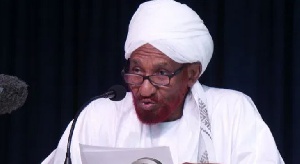 Sadiq Al-Mahdi is the leader of Sudan
Sadiq Al-Mahdi is the leader of Sudan
African political history over the last two centuries can be summarized as the African peoples’ struggle against dominance by Western powers, and this even includes the period after most of the territories carved up by Europeans had won sovereignty.
This struggle found its expression in the creation of political organizations committed to the interests of some peoples in the colonies. While there were those who sought outright independence, some agitated for economic, identitarian, and social interests.
As such, there are a number of political parties existing to date that predate how long the countries in which they were found have existed as independent entities. The oldest of these political parties are the point of this piece,
Nevertheless, it is important to simplify what is meant by a political party and disambiguate it from organizational political traditions. We may think of a party as the association of like-minded people who are united by their opposition to another group’s political aspirations in a representative democracy. They seek power through elections in order to actualize their plans for the society.
A political tradition could come down to the philosophy and praxis entertained by a party or political organization and passed on to generations down the line. Political traditions are also not party-specific. In Ghana, for instance, about five parties say they are Nkrumahist, in honor of first president Kwame Nkrumah.
Isolating political traditions from political parties is important because as we will see, some African political organizations were not election-competing parties until a certain point in their history. Another reason is that certain parties that embodied certain traditions no longer exist and their traditions have died with them. The National Party of South Africa comes to mind on this front.
Here, as follows, are Africa’s oldest political parties:
African National Congress -1921
The African National Congress (ANC) of South Africa was founded in 1921 as a body seeking social and political rights on behalf of Black South Africans. The ANC carried with it the aspirations of Black people who sought self-determination in a country and period that insisted on preferential treatment for white South Africans.
Nelson Mandela rode to global prominence with the ANC.
2. Muslim Brotherhood – 1928
The Muslim Brotherhood is a transnational Muslim sociopolitical organization founded in Egypt that seeks to according to many of its proponents, to establish Islamic states in democratic cultures. But the group’s religious sympathies and fundamentalism mean that it is abhorred by many in some of the countries the group is located.
The Muslim Brotherhood, through its party affiliate, the Freedom and Justice Party, contested elections in 2011 in Egypt and won with Mohamed Morsi emerging as Egypt’s first elected president.
3. Mauritius Labour Party – 1936
The Labour Party of Mauritius was founded for a purpose not unlike many other parties that go by the name Labour. In the tiny island, the foundation of the Labour Party in 1936 was to protect workers rights in the county that was founded primarily as a commercial venture.
Many of the poor in the early 20th century were Indian immigrants working on European owned plantations and factories.
4. Kenya African National Union – 1944
The Kenyan African National Union (KANU), formerly the Kenyan African Union, was founded as momentum gathered in Kenya for independence. But the party was also founded in accordance with Luo and Kikuyu ethnic interests in the face of European colonial misrule.
KANU was the lead organization rallying people to push for independence as was conceptualized by Kenya’s first president, Jomo Kenyatta.
5. National Umma Party -1945
The National Umma Party (NUP) is one of the two parties in Sudan which predate the country’s independence but still exist today. The party was founded in pursuit of Sudanese independence but was also a political vehicle that offered a choice apart from the religious fundamentalist organizations in Sudan at the time.
For much of its history, the NUP has been led by Sadiq Al-Mahdi, whose character and interests have shaped the party.